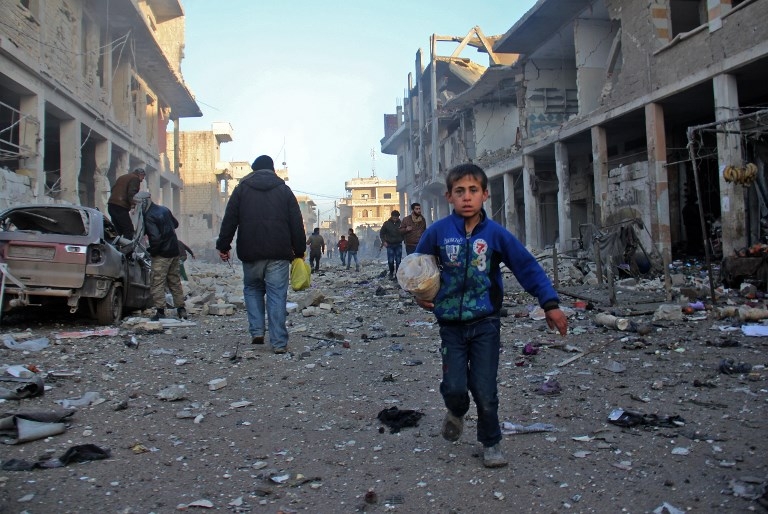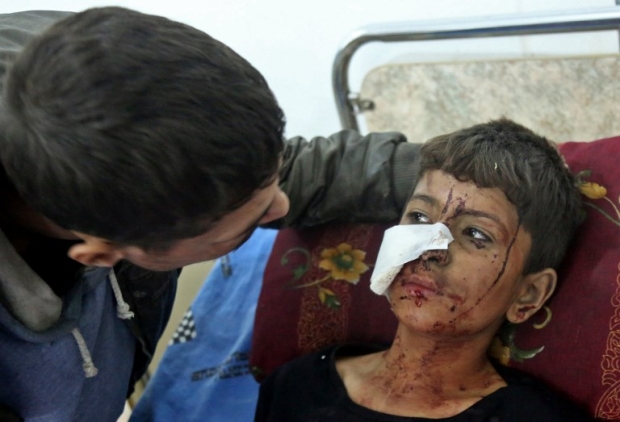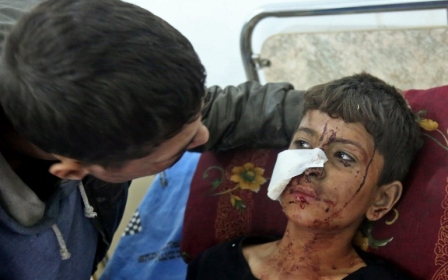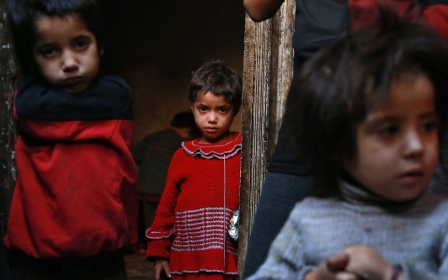IS strikes are likely to continue if the West abandons Syria

As world media attention is focused on the eighth round of UN-backed Syria peace talks in Geneva that took off this week, the recent uptick in attacks on two key de-escalation zones, Idlib and Eastern Ghouta, has received little or no attention in the media in the UK and Europe, jointly wallowing in the mire of Brexit.
But the attacks raise serious concerns about the so-called "de-escalation" zones that are evidently turning from safe zones to "kill zones".
Indescribable hell
The safe zones were born out of an accord between Russia, Iran, Turkey and the Syrian government. According to the deal, there are four de-escalation zones where attacks were meant to decrease and thus pave the way for the peace process to take hold.
The areas include: Idlib province, the Rastan and Talbiseh enclave in northern Homs province, the rebel-controlled south along the border with Jordan that includes parts of Daraa and Quneitra provinces and Eastern Ghouta in the northern Damascus countryside.
The international community is in danger of repeating the mistakes of the US-led invasion of Iraq in 2003 if it does not now fully engage to support some sort of peaceful settlement in Syria
The agreement also stated that while the rebels would refrain from new attacks, sieges are to be lifted to allow free movement of goods and people.
However, the recent surge in air strikes and attacks on Eastern Ghouta, supposedly a safe zone, proves time and again that such an agreement failed to protect the civilian population.
On 13 November, Syrian and Russian air strikes on the marketplace at Atarib in Idlib killed up to 50 people. Many of the survivors were treated at a hospital run by the Union of Medical Care Organisations in Syria (UOSSM). UOSSM provide most of the medical care in Idlib and is on its last legs.
"Our hospitals are at breaking point, we are desperate for medicines. People are losing hope as our cries are ignored by the West. The humanitarian situation is very dire," Dr Ghanem Tayara, UOSSM director told me.
There are two million people now corralled in Idlib with the remnants of Islamic State and al-Qaeda, unable to leave and are being routinely targeted by both Syrian regime and Russian air strikes in their makeshift homes.
The recent surge in air strikes and attacks on Eastern Ghouta, supposedly a safe zone, proves time and again that such an agreement failed to protect the civilian population
The place has been raised to the ground with little infrastructure and very little food and medicines are running out. It is an indescribable hell on the shores of Europe.
People trapped in Idlib suffer constant bombardment and are being abandoned by the West. This abandonment contributed to IS rise in the first place. Once again these seeds of discontentment are growing in Idlib.
A glaring example of the failure of the de-escalation zones agreement is that of Eastern Ghouta. According to this MEE report, the rebel-held enclave is facing a critical humanitarian crisis as government bombing and siege tactics kill dozens of civilians and bring many more to the brink of starvation. And the world turns a blind eye.
IS not dead yet
On 18 November, the besieged Eastern Ghouta was targeted by yet another gas attack when a medical centre said that two patients appeared to be suffering from the effects of chemical gas. At least 37 people were being treated for injuries from an unidentified gas attack.
Sadly, chemical weapons have been routinely used in Syria's war due to the international community's inaction. Although US President Donald Trump's surgical air strike last April after the Sarin nerve agent attack on Khan Sheikhoun in Idlib gave hope that the taboo on the use of chemical weapons would be restored, it nonetheless proved to be a singular action with little lasting effect.
But as the US and UK step down their military effort after defeating IS in Iraq and Syria, it is feared that Idlib might prove to be a potential breeding ground to absorb IS ranks as popular discontent grows among a civilian population which feels increasingly abandoned by the West.
While the US coalition has enabled the military defeat of IS in Iraq and Syria, this has been geographically focused around Mosul and Raqqa.
Many IS fighters who managed to escape have either headed to Idlib or gone underground. The powers of influence at the helm of IS describe the caliphate as "occupied" and ready to rise again and have called on its followers to carry out attacks in the West.
However, the international community is in danger of repeating the mistakes of the US-led invasion of Iraq in 2003 if it does not now fully engage to support some sort of peaceful settlement in Syria.
IS's military defeat is only the beginning and not the end. The disengagement of the permanent five members of the United Nations Security Council has the potential to turn the clock back to 2014 when IS took vast swathes of land in Syria and Iraq.
We have seen how chemical weapons have become the norm through UNSC inaction, surely the re-birth of IS through similar inaction should not be allowed.
A peace process in Syria?
The other members of the P5 must engage with Russia and Syria to drive through the Geneva Peace process to find a diplomatic solution and provide aid and reconstruction to Idlib and elsewhere.
The Russians will bring the Syrians and the Iranians to the negotiating table and it is behoven on the US, UK and France to bring the opposition groups.
The two million civilian population trapped in Idlib have two choices at the moment. They can stay put, be starved and bombed by Russian and Syrian government air strikes, or they can turn to the militants and join IS.
Britain may have lost some standing on the world stage, its military power may be diminished as described by General Richard Baron's testimony to the UK parliamentary defence committee, but it remains a permanent member of the Security Council, and has the diplomatic skills that could enable it to play a leading role in the Geneva process.
The alternative to this is disengagement, the rebirth of IS and an even greater terror threat to London, Paris, New York and Moscow. Of course ending the suffering of civilians trapped in Idlib should be prioritised, however, the international community does not seem to be much swayed by the suffering of the people in Syria.
The unpalatable truth is that intervention post-Iraq and Afghanistan is being avoided at all costs, with most governments now only prepared to act in defence of their own countries.
It must be worth bending your backs to enable a peace in Syria, Mr Trump, Mrs May and Monsieur Macron?
- Hamish de Bretton-Gordon is a director of Doctors Under Fire and an adviser to the Union of Medical Care and Relief Organisations. A former soldier, he was commanding officer of the UK Chemical, Biological, Radiological and Nuclear (CBRN) Regiment and Nato’s Rapid Reaction CBRN Battalion.
The views expressed in this article belong to the author and do not necessarily reflect the editorial policy of Middle East Eye.
Photo: A Syrian boy on the outskirts of Idlib runs while carrying bread after a government air strike in his town in January 2017 (AFP)
New MEE newsletter: Jerusalem Dispatch
Sign up to get the latest insights and analysis on Israel-Palestine, alongside Turkey Unpacked and other MEE newsletters
Middle East Eye delivers independent and unrivalled coverage and analysis of the Middle East, North Africa and beyond. To learn more about republishing this content and the associated fees, please fill out this form. More about MEE can be found here.






